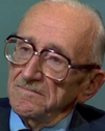
Friedrich A. Hayek
Friedrich A. Hayek (1899-1992) was the best-known advocate of the Austrian economics. He earned his doctorates in law and political science at the University of Vienna. He attended the Ludwig von Mises’ private seminar; in 1927, he became director of the Austrian Institute for Business Cycle Research; and in the early 1930s he moved to the faculty of the London School of Economics.
Hayek’s works were mostly focused on the Austrian theory of the business cycles, capital theory, and monetary theory. During his life, he defended free markets and spontaneous order.
He founded, along with Milton Friedman, George Stigler, and others, the Mont Pelerin Society. He was professor of social and moral sciences at the University of Chicago, United States; professor of economic policy at the University of Freiburg, Germany, and he also taught at the University of Salzburg, Austria.
In 1974, he shared the Nobel Prize with Gunnar Myrdal «for their pioneering work in the theory of money and economic fluctuations and for their penetrating analysis of the interdependence of economic, social and institutional phenomena.»
He is author of the books: Prices and Production, The Road to Serfdom, The Counter-Revolution of Science: Studies in the Abuse of Reason, The Sensory Order: An Inquiry into the Foundations of Theoretical Psychology, The Constitution of Liberty, and The Fatal Conceit.

